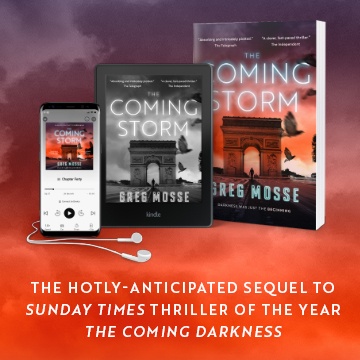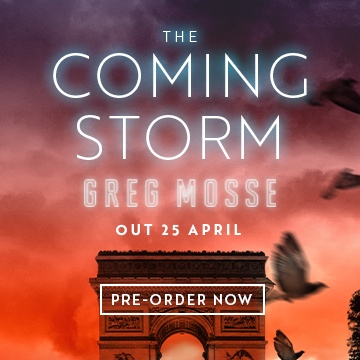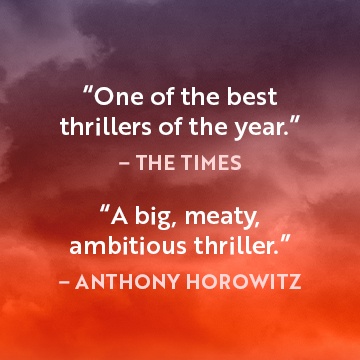Not long ago, the town of Stirling hosted Bloody Scotland, a literary festival dedicated to the one of the country’s finest exports: crime fiction. Tartan noir has arguably become as well known as Scotch whisky. But how can we account for the disproportionate success of Scottish authors in recent years? Glasgow-born TF Muir is the author of the DCI Andy Gilchrist series – Eye for an Eye, Tooth for a Tooth, and Hand for a Hand – set in St Andrews. Today he joins us to help explain Scotland’s penchant for great crime stories…
 Guest column by TF Muir — With all the talk about should or shouldn’t the Scots vote for independence, many of us are giving serious thought to the question, Can we really go it alone? How could we afford it? Where would our revenue come from? Whisky and wool seem to be our two most famous exports, but is that enough to keep us afloat in an increasingly competitive and burgeoning global market? Well, someone once said to me that crime writing could be one of Scotland’s biggest cultural exports. On hearing that, the word gobsmacked sprang to mind.
Guest column by TF Muir — With all the talk about should or shouldn’t the Scots vote for independence, many of us are giving serious thought to the question, Can we really go it alone? How could we afford it? Where would our revenue come from? Whisky and wool seem to be our two most famous exports, but is that enough to keep us afloat in an increasingly competitive and burgeoning global market? Well, someone once said to me that crime writing could be one of Scotland’s biggest cultural exports. On hearing that, the word gobsmacked sprang to mind.
In the midst of the recent mind-blowing success of Scandinavian crime novelists Steig Larsson, Henning Menkell, Jo Nesbo, et al, it is not a little known fact that Scotland has its own fair share of best-selling crime writers. Ian Rankin – who once said that Scandinavian crime writers are no better than Scottish crime writers, they just have better PR – along with Val McDermid, Stuart MacBride, Quintin Jardine, Alexander McCall Smith, Christopher Brookmyre, Denise Mina, and Anne Perry, have sold in excess of a staggering 100 million copies of their books worldwide. Average out a price per book at £10, and that equates to more than £1billion, thank you very much, not a trifling sum in any country’s budget. And snapping at their crime-writing heels, and closing in, are as-yet other lesser-known novelists – Alex Gray, Lin Anderson, Tony Black, Caro Ramsay, and Craig Robertson, et al, not to forget Craig Russell who appears to have hit the motherlode in Germany.
So why do the Scots have so many talented crime writers, and why are so many of their novels saturated – make that blood-soaked – with gory and gruesome tales?
I think you have to live in Scotland to have a better understanding of the answer to that. On a rare summer’s day, when the skies are cloudless and the air hints of warmth, there are fewer places on Earth as naturally beautiful. Regrettably, summer can be a selection of dry days sprinkled among weeks and months of cold winds and horizontal rain – if it appears at all some years – and it is almost mind-defying how unappealing the place can sometimes be.
Everyone seems to complain endlessly about the weather, then turns on a sixpence when the sun shines. As a child living in Scotland, I used to dream of exotic places, and forever wondered what it would be like living where the weather was warm and sunny, and rain was something you rarely saw. Reading became a form of escapism for me – tales of adventure in the Caribbean and Pacific islands, the forests of the Adirondacks, or the African hinterland. My most prized book as a ten-year-old was an annotated book of countries around the world – an image of a young man swimming deep in turquoise waters has stayed with me ever since. As an adult, I am reluctant to confess that upon graduation the miserable Scottish weather drove me to seek a professional life overseas, but it does seem odd that I ended up working in countries where the weather was renowned to be hot – Bahrain, Qatar, Saudi Arabia, and the United States.
It would not be a major stretch of the imagination to think that other novelists felt the same way about Scotland. A sense of dark morbidity about the place – in the Strathclyde valley in winter the sun rises around 9am and sets around 3pm – makes it perfect from which to coin the phrase tartan noir. Winter can be damp, dreary, cold, and miserable, aggravated by the seemingly never-ending rain – I feel depressed just writing about it – and I believe it is no small coincidence that Scandinavian writers are so dark and deep into crime, too. I mean, what is there to be cheerful about?
Christopher Brookmyre, who successfully manages to inject humour into his crime novels, maintains that the Scandinavian countries have the Scots beaten for suicide, but the Scots have them beaten for crime. Having said that, we all don’t go slumping around Scotland groaning and thinking of ways to commit suicide or murder our nearest and dearest, rather we often turn the bad into the funny. In fact, I have found that there is no other humour in the world like Glasgow humour – fast, witty, and black as muck. You have to be thick-skinned to live in Scotland, not just to survive the weather, but also to handle the take-no-prisoners-humour – which could explain why rejections or bad reviews never really bother me.
I am often asked why I chose St Andrews as a location for my crime series – after all, it is an attractive coastal town with beautiful beaches. But in my mind I see it as a small town with cobbled streets and old stone buildings, and a derelict castle and cathedral ruins, with black-faced cliffs rearing over thrashing seas, and of course, that cold and wet and miserable Scottish weather battering the place senseless – perfect for writing a crime story.








